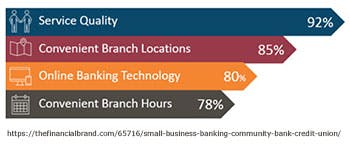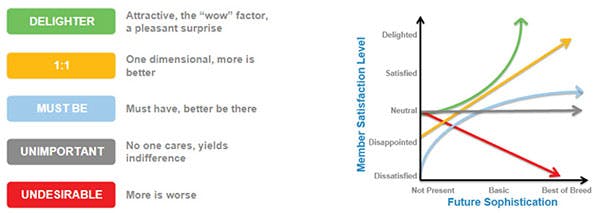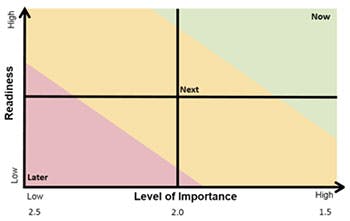


BMI Federal Credit Union develops approach to understand and meet the needs of their small business members
Client background
BMI Federal Credit Union (BMI FCU) is a financial services organization with over $450M in assets and 10 branches serving the central Ohio region.
Project background
The Small Business Member Experience project, led by Baker Tilly’s Growth Strategies team, consisted of a partnership between MDC, Corporate One, and BMI FCU. The small business ‘program’ at BMI FCU was the foundation for the project’s member research and innovative idea development. MDC and Corporate One served in a consulting/supporting role in the project.
Small business accounts represent an attractive and important member segment for credit union owners. On average, they contribute higher revenue margins and a greater propensity to purchase more services from their credit unions. BMI FCU sought to gain a better understanding of its small business members to better meet their needs and desires. The project set out to:
- Identify the needs and expectations of current and potential small business members.
- Develop a pipeline of ideas that BMI FCU can deploy to attract small businesses.
- Apply research validation to prioritize, map, and implement the most attractive ideas for small business members.
The Baker Tilly approach
Baker Tilly utilized its proven member experience methodology and worked alongside BMI FCU to develop an approach to understand and meet the needs and desires of the small business segment. This was accomplished in three phases:
- Current State Assessment
- Innovation and Kano Model Research
- Future State Roadmap and Project Charters
Phase 1: Current state assessment
Objectives:
- Understand the current national small business market
- Understand the current experience of BMI FCU’s small business members
Key Deliverables:
- BMI FCU data analysis
- National market survey analysis
- Focus group and BMI staff interview analysis
- Current state journey map
Phase Details:
The current state assessment included a data analysis of BMI FCU’s small business accounts and gathering a better understanding of small business members’ relationships with their financial institutions through primary and secondary research. Primary research included Baker Tilly directing a national survey of small business owners about their financial institution relationships, as well as conducting BMI FCU small business member focus groups and staff interviews.
Secondary research identified several priorities that small business owners have when interacting with their financial institutions, including:
- Service quality
- Convenient branch locations
- Online banking technology
- Convenient branch hours

The national survey results revealed that while two out of three small business owners choose a large bank as their financial institution, those who bank at a credit union are 32% more satisfied with their experience.
The BMI FCU focus groups and staff interviews disclosed that small business members highly value the personalized service they receive at BMI. Members identified that international wires, technology and business education were some of their top wants, while low rates/fees and personal care were top needs.
The results of the data analysis, survey, focus groups and staff interviews helped guide BMI FCU into the Innovation and Kano Model Research Phase.
Phase 2: Innovation and Kano Model research
Objectives:
- Generate ideas to enhance the BMI FCU small business member experience
- Test the ideas and capture feedback from BMI FCU members
Key Deliverables:
- A pipeline of ideas from an innovation workshop
- Kano Model survey for BMI FCU members
Phase Details:
Baker Tilly and BMI FCU conducted a two-day innovation workshop where ideation exercises were used to generate ideas that could enhance the BMI FCU member experience. The team came up with roughly 30 innovative ideas that were then narrowed down to 13. The top 13 ideas were then tested with BMI FCU’s small business members for their attractiveness, using a Kano Model Survey.
The Kano Model categorized ideas into five different classifications based on small business member feedback:

These classifications helped BMI FCU understand the expectations of small business members and their reactions to the ideas. These understandings served as guidance for the future state road map and project charters in the next phase.
Phase 3: Future state roadmap and project charters
Objectives:
- Form conclusions from the Kano survey
- Facilitate a workshop to develop a future state roadmap and project charters
Key Deliverables:
- Future state journey map
- 12-18 month idea roadmap
- Project charters to implement ideas within six months
Phase Details:
BMI FCU’s small business ideas generated from the innovation workshop resonated with members. Eight of the top 13 ideas generated during the innovation workshop scored as "Delighters” in the Kano survey.
For example, one “Delighter” idea was a customized fee schedule:
Idea: When signing up for merchant services (so I can accept payments from my customers), I am able to select from several customized fee schedules depending on my business needs. For example, I may pay a high monthly flat-fee in exchange for low per- transaction fees, OR I may pay high per-transaction fees in exchange for a low monthly fee.
The customized fee schedule idea was a “Delighter” because it delivered on both the member’s want for personalization and need for low rates and fees.
BMI FCU to implement.
The BMI FCU team also created project charters for ideas that fell into the “Now” column (ideas to be This idea, along with the other “Delighter” ideas, were scored and plotted on a Now, Next, Later road map based on the importance of the idea to BMI FCU members and the readiness for implemented within six months). Project charters allowed BMI FCU to develop an action plan (human, systems, processes, etc.) to implement the ideas, and develop considerations for the resources that would be involved (people, process, and technology).

The business impact
- A better understanding of national and BMI FCU-specific small business members.
- A tested and prioritized list of innovative ideas to integrate into the BMI FCU small business member experience.
- A roadmap for implementing the ideas based on importance and readiness to implement.
- Better positioning for BMI FCU to win in the small business member segment.
For more information on this topic, or to learn how Baker Tilly specialists can help, contact our team.
© 2024 Baker Tilly US, LLP
